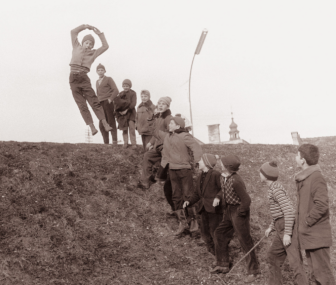Clarity in Chaos
Advice for navigating transitions in work, life, and relationships from Dr. Loretta L.C. Brady and her team members at BDS Insight.

Submit your question for a future column here via this secure form.
Dear Dr. Brady,
Summer vacation is about to start which means my family can breathe a deep sigh of relief. This year it seemed not a week would go by when I wasn’t hearing something from my son’s school about his behavior. Mostly it seemed to boil down to his being ‘antsy,’ moving too much, being distracted during quiet time, not sitting still. My boy is certainly an active kid, but he doesn’t cause trouble in other settings. His reading and math are right on track for his grade (first) and he has a nice group of friends. I am not worried that he is struggling in school, but he has been less excited about going this year. I have been reading a lot lately about the ways some classroom practices lead to boys being labeled “bad” simply because they need to be active. Is there something going on here or am I being over-sensitive? Is there anything I can do before he heads into his next school year, or just cross my fingers and hope?
Signed,
Mom of School-dazed Son
Dear School Dazed:
Do you know the story of John James Audubon? He spent most of his days alone or in the fields, obsessively drawing and observing wildlife. At 18 he discovered that small birds migrate, returning to their nesting grounds in the spring, along with their offspring who nest nearby. He didn’t discover this by sitting in his perfectly organized school room, or at the elbow of a seasoned mentor. Instead he discovered this, and shared his discoveries, through meticulous trial and error. Today’s educational environment can be so focused on the final score or winning goal that children are discouraged from exploration and passion pursuits. And active students who seem to be a mismatch for their less active environments can feel a little of their learning light go dim.
I don’t blame you for feeling relieved for summer time, for the freedom and relaxed schedule. I have no doubt your son will flourish with the “lake time” agenda. But I hear you have some concerns about whether this is typical “boyness” or something that could interfere with his success as he gets into second grade. Or maybe this is something different altogether, some conspiracy against the vibrancy of male children. What should a parent do when Jackson’s teacher sends note home about his disruptive behavior?
What happened to “boys will be boys”? Is this just gender exclusion?

When we compare all boys to all girls, we know that the differences between them are smaller than the differences we see when we only compare all boys to all other boys. Between group differences are always smaller than within group differences, no matter what we are comparing and regardless of how counterintuitive it may seem. This isn’t to say that boys are not more active than girls, just that we will always be able to find some girls who are more active than some other boys. Are today’s children, boys and girls, more active than in years past? No, but several studies have documented the ways in which our educational system requires far more stillness in children than it did in years past. The result: more disciplinary actions against fidgety and disruptive kids. Not surprising, this impacts boys more than girls, by some counts almost 3 to 1. And while your son is exiting first grade, studies reveal these impacts begin even in preschool – boys are more often expelled from preschool and kindergarten settings than are girls.
As if this challenge wasn’t significant enough, early learning places a big emphasis on literacy and verbal skills. Boys tend to have a faster motor development schedule and a slower verbal development schedule. So, they get to school with great gross-motor ability while school is stretching them to practice fine motor and language skills. You know who is really good at telling stories and manipulating small objects by age 3 or 4? Girls. And this strength continues to build and be rewarded in children through young grades. Combining these with the fact that the majority of early school teachers are women and you begin to get a specific picture of what early educational experiences are like for boys: environments that expect stillness, tasks that demand skills you may have not yet acquired while those (girls) who have get rewarded (smiles, stickers, names learned quickly) by people you won’t grow up to be (women). If it seems like maybe school isn’t really for boys, it isn’t surprising that some boys find themselves tuning out and turning away from school, or school-like activities, at fairly early ages. And this matters, because boys have higher drop-out rates in high school and enter college at lower rates than girls.
Related link via PBS.com: Raising and Understanding Boys
So, what do we do with this information? First, take heart that what you are experiencing isn’t happening only to your son. And rest assured that he can be successful in life, and in school, without killing his spirit. I can’t say from this note whether there might be any attentional or learning disorders impacting your son’s behavior, but your statement that he is on time in school and not disrupting other environments suggest that he isn’t dealing with ADHD/ADD or learning disability. If this is a concern you have it is worth getting a referral to a neuropsychologist for further evaluation. They could identify any challenges and work with your family to develop a behavioral plan that will help your child keep pace with his peers and reach his goals.
 But if there are no clinical issues or learning concerns then the best thing to do is to find ways to engage your son’s curiosity and learning approach while helping him cultivate the skills that will be rewarded back in the classroom. What does John James Audobon have to do with your son? Like Audubon, let him wander, let him discover, and help him communicate his findings in a way that highlights his strengths and helps him share with others what he has learned. As the school year starts, pay attention to how many movement breaks there are in the regular day. Encourage your son’s teacher to incorporate movement into the learning. If necessary, work with an occupational therapist who can find subtle ways to channel your son’s movement during his school day in a way that is less disruptive for his peers (therapy bands on the legs of his desk to stretch his legs into, chewing gum for quiet activities). This isn’t just hooey; it’s actually from a set of best practices teachers are using to consistently engage physically active learners and to help retain the learning spark that some boys see fade in early school years.
But if there are no clinical issues or learning concerns then the best thing to do is to find ways to engage your son’s curiosity and learning approach while helping him cultivate the skills that will be rewarded back in the classroom. What does John James Audobon have to do with your son? Like Audubon, let him wander, let him discover, and help him communicate his findings in a way that highlights his strengths and helps him share with others what he has learned. As the school year starts, pay attention to how many movement breaks there are in the regular day. Encourage your son’s teacher to incorporate movement into the learning. If necessary, work with an occupational therapist who can find subtle ways to channel your son’s movement during his school day in a way that is less disruptive for his peers (therapy bands on the legs of his desk to stretch his legs into, chewing gum for quiet activities). This isn’t just hooey; it’s actually from a set of best practices teachers are using to consistently engage physically active learners and to help retain the learning spark that some boys see fade in early school years.
You are right to want your son to have the freedom to be himself even while he learns how to fit into his classroom.
Alright, it’s your turn. I hope you’ll join me in seeking clarity for the shifts you are navigating.
 Readers of Manchester Ink Link seek relevant, local, and pragmatic reporting. Carol Robidoux provides layered reports that allow all of us to feel not only part of the story, but partners in resolution. My hope is that this column will serve as a compass for readers seeking clarity in the chaos of their businesses, personal lives, or relationships. From time to time we will have guest columnists offer their insight on a challenge. This information is simply opinion, but I hope you will share your stories so that others can gain clarity for themselves. Questions are powerful. We hope you will share yours here
Readers of Manchester Ink Link seek relevant, local, and pragmatic reporting. Carol Robidoux provides layered reports that allow all of us to feel not only part of the story, but partners in resolution. My hope is that this column will serve as a compass for readers seeking clarity in the chaos of their businesses, personal lives, or relationships. From time to time we will have guest columnists offer their insight on a challenge. This information is simply opinion, but I hope you will share your stories so that others can gain clarity for themselves. Questions are powerful. We hope you will share yours here

Loretta L.C. Brady owns BDS Insight a culture, crisis, and conflict management firm in Manchester. She is an Associate Professor of Psychology at Saint Anselm College. She, her husband Brian Brady, and their 5 children live and work in Manchester. The opinions or views expressed in this column are not intended to treat or diagnose; nor are they meant to replace the treatment and care that you may be receiving from a licensed professional, physician or mental health professional.
 This column, its author, the newspaper and publisher are not responsible for the outcome or results of following any advice in any given situation. You, and only you, are completely responsible for your actions. Dr. Loretta L.C. Brady, clinical and organizational psychologist, offers her and guest columnist opinions on a variety of current event and reader submitted subjects. She and they are expressing personal and professional opinions and views. Manchester Ink Link and Dr. Loretta L.C. Brady are not responsible for the outcome or results of following the advice of this column in any given situation.
This column, its author, the newspaper and publisher are not responsible for the outcome or results of following any advice in any given situation. You, and only you, are completely responsible for your actions. Dr. Loretta L.C. Brady, clinical and organizational psychologist, offers her and guest columnist opinions on a variety of current event and reader submitted subjects. She and they are expressing personal and professional opinions and views. Manchester Ink Link and Dr. Loretta L.C. Brady are not responsible for the outcome or results of following the advice of this column in any given situation.







